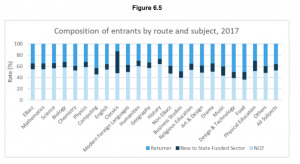Finally! A £9000 training bursary: the business studies teacher shortage
The teacher shortage in business education has become stark. Just 155 people are training to be business teachers in the UK in 2019/20 and only 80 of these are studying for their PGCE at a University. This is down from 170 last year and at a time when Department for Education data suggest only 78% of business teachers who qualified in 2017 were still in teaching in 2018 with only 60% of those who trained in 2012 still teaching in 2017, one of the lowest rates across all subjects. The Department for Education’s announcement that PGCE business education trainees will receive a £9000 training bursary from 2020/21 is therefore long overdue. It’s also recognition that successful schools teach a broad and balanced KS4 curriculum beyond the EBacc that enriches and enthuses students with a range of interests.
Data from the Joint Council for Qualifications (JCQ) shows an increase in the number of students sitting GCSE Business Studies in 2019. Vocational options such as VCERT and BTEC National also continue to be popular. A level Business Studies numbers remain strong, with an increase in the subject’s popularity since the introduction of a new syllabus for the return to linear exams.
In 2018, the average Progress 8 score of school performance in the ‘open bucket’, where non-EBacc subjects are credited, was higher than for the non-open subjects. Whilst some of this has been put down to schools entering students for the ECDL IT qualification (which will now no longer contribute), this Ofsted blog suggests a need for further investigation: those of us who teach business, art, drama and origami would suggest it’s because we have to teach well to keep our subjects on the curriculum. There’s no compulsion for schools to teach business. Perhaps the new bursaries for subjects in the ‘open’ bucket are recognition for our contribution…
So, it’s clear that more students want to study business. But have we enough teachers?
The Department for Education Analysis of Teacher Supply, Retention and Mobility (2018) suggests that an additional 7% of the current stock of business teachers are added to the profession each year. This is made up of around 4% returning teachers (an equal number of males and females) and 3% NQTs (one of the lowest proportions in all subjects). Around 600 business teachers left the profession between 2015 and 2017, or 11% of the stock. At a rough approximation, that means the total number of business teachers is falling by 4% per year, every year. Another 10% of the current stock of business teachers are ‘out of service’: qualified, not yet at retirement age but no longer teaching business in schools and colleges, a similar rate to other subjects. This ‘wastage rate’ in business studies is slightly higher for females than males. More teachers left teaching than started in the profession in 2017 in all subjects bar maths and physics.

Further DfE data suggest 31.5% of business and economics teachers do not have a qualification above A level in the subject- this is lower than in Computing and Engineering but higher than in German, Chemistry and Maths, where teachers are more likely to have a degree in the subject. This should set alarm bells ringing and means not all of those teaching business and economics are subject specialists.
Might we get to a point where some schools remove business from the curriculum because there are not enough specialist teachers and such a small number of NQTs means retirees and leavers are harder to replace?
At the University of Manchester we have begun to get emails and phone calls from schools and colleges keen to recruit a business teacher earlier than usual, particularly from 11-18s and sixth form colleges. In a typical year, our trainees are usually split 50:50 in terms of those who go on to work in schools and those who choose colleges. We continue to recruit trainees from a range of backgrounds: new graduates, career changers and mature applicants; from traditional and new universities and those with a passion and enthusiasm for working with young people, which we test at interview.
So what can we do as teachers in schools and colleges?
First, publicising the bursary so that potential new trainees know they will – finally- receive the financial support already gained by those training to teach an EBacc subject. Hopefully, this can increase the number of NQTs. Second, shifting the focus of teacher recruitment campaigns to the joys of teaching business education and away from the media stories of poor behaviour and long working hours. It’s a pleasure to work with so many happy, successful teachers and mentors who support our trainees in partnership schools and colleges. Third, continue to fight our corner as business and economics teachers, making clear the value of our subject at KS4 and continuing to enthuse so many students to continue their studies at age 16 and beyond.





0 Comments